九年级英语unit 6导学案
九年级上英语导学案
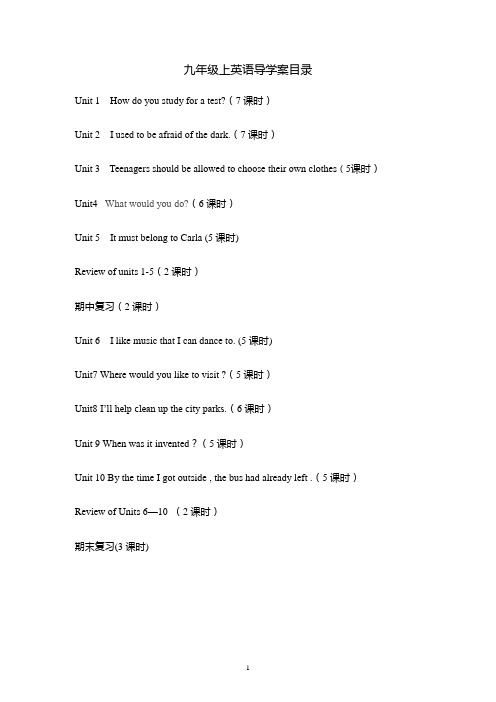
九年级上英语导学案目录Unit 1 How do you study for a test?(7课时)Unit 2 I used to be afraid of the dark.(7课时)Unit 3 Teenagers should be allowed to choose their own clothes(5课时)Unit4What would you do?(6课时)Unit 5 It must belong to Carla (5课时)Review of units 1-5(2课时)期中复习(2课时)Unit 6 I like music that I can dance to. (5课时)Unit7 Where would you like to visit ?(5课时)Unit8 I‘ll help clean up the city parks.(6课时)Unit 9 When was it invented?(5课时)Unit 10 By the time I got outside , the bus had already left .(5课时)Review of Units 6—10 (2课时)期末复习(3课时)Unit 1 How do you study for a test?本单元主要是学习用How 来询问学习方法,通过互相询问讨论,掌握by的用法,同时找到适合自己的学习方法,找出自己在英语学习中的困难。
(共计7时)第1课时Section A 1a-2c【学习目标】1掌握新单词flashcard, vocabulary, aloud, pronunciation2熟练运用how 引起的特殊疑问句及by的用法。
3能够听懂有关学习方法的简短对话。
【学习重难点】1熟记重点单词短语。
2语法:by + 动词ing的用法3句型How do you study for a test? I study by working with a group.【学习过程】一课前预习:(教师寄语:预习感知,有备无患。
人教版英语九年级全册第六单元Section A (4a-4c)Grammar focus
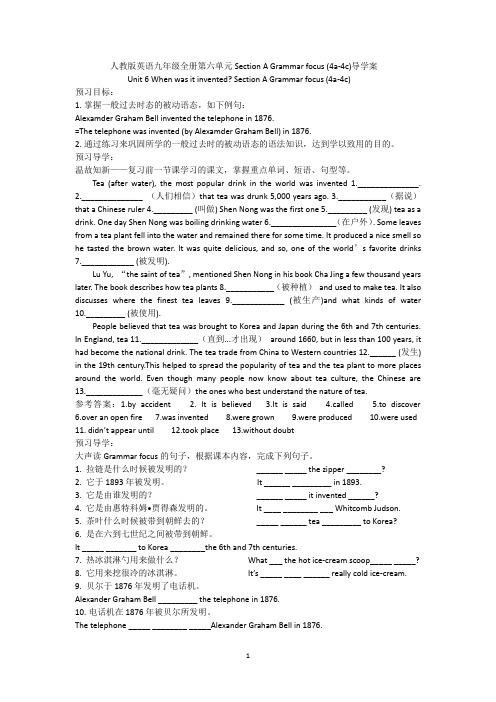
人教版英语九年级全册第六单元Section A Grammar focus (4a-4c)导学案Unit 6 When was it invented? Section A Grammar focus (4a-4c)预习目标:1.掌握一般过去时态的被动语态,如下例句:Alexamder Graham Bell invented the telephone in 1876.=The telephone was invented (by Alexamder Graham Bell) in 1876.2.通过练习来巩固所学的一般过去时的被动语态的语法知识,达到学以致用的目的。
预习导学:温故知新——复习前一节课学习的课文,掌握重点单词、短语、句型等。
Tea (after water), the most popular drink in the world was invented 1.______________.2.______________ (人们相信)that tea was drunk 5,000 years ago.3.___________(据说)that a Chinese ruler4._________ (叫做) Shen Nong was the first one5._________ (发现) tea as a drink. One day Shen Nong was boiling drinking water6._______________(在户外). Some leaves from a tea plant fell into the water and remained there for some time. It produced a nice smell so he tasted the brown water. It was quite delicious, and so, one of the world’s favorite drinks7.____________ (被发明).Lu Yu, “the saint of tea”, mentioned Shen Nong in his book Cha Jing a few thousand years later. The book describes how tea plants 8.___________(被种植)and used to make tea. It also discusses where the finest tea leaves 9.____________ (被生产)and what kinds of water 10._________ (被使用).People believed that tea was brought to Korea and Japan during the 6th and 7th centuries. In England, tea 11._____________(直到...才出现)around 1660, but in less than 100 years, it had become the national drink. The tea trade from China to Western countries 12.______ (发生) in the 19th century.This helped to spread the popularity of tea and the tea plant to more places around the world. Even though many people now know about tea culture, the Chinese are 13._____________(毫无疑问)the ones who best understand the nature of tea.参考答案:1.by accident 2. It is believed 3.It is said 4.called 5.to discover 6.over an open fire 7.was invented 8.were grown 9.were produced 10.were used 11.didn’t appear until 12.took place 13.without doubt预习导学:大声读Grammar focus的句子,根据课本内容,完成下列句子。
外研版英语九年级上册全册导学案含答案
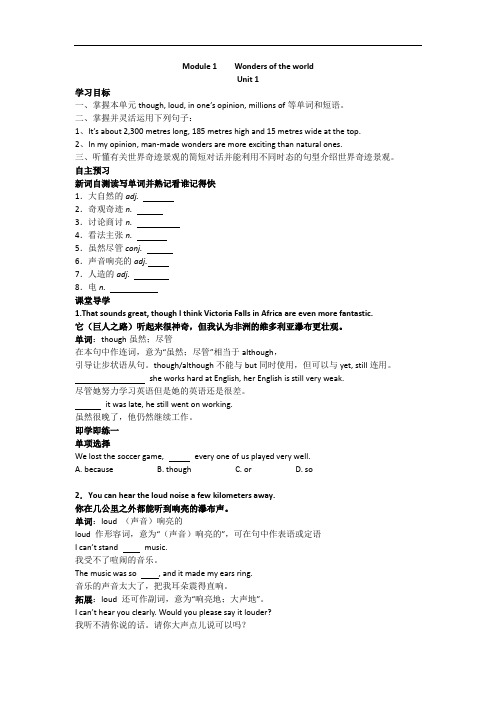
Module 1 Wonders of the worldUnit 1学习目标一、掌握本单元though, loud, in one’s opinion, millions of等单词和短语。
二、掌握并灵活运用下列句子:1、It’s about 2,300 metres long, 185 metres high and 15 metres wide at the top.2、In my opinion, man-made wonders are more exciting than natural ones.三、听懂有关世界奇迹景观的简短对话并能利用不同时态的句型介绍世界奇迹景观。
自主预习新词自测读写单词并熟记看谁记得快1.大自然的adj.2.奇观奇迹n.3.讨论商讨n.4.看法主张n.5.虽然尽管conj.6.声音响亮的adj.7.人造的adj.8.电n.课堂导学1.That sounds great, though I think Victoria Falls in Africa are even more fantastic.它(巨人之路)听起来很神奇,但我认为非洲的维多利亚瀑布更壮观。
单词:though虽然;尽管在本句中作连词,意为“虽然;尽管”相当于although,引导让步状语从句。
though/although不能与but同时使用,但可以与yet, still连用。
she works hard at English, her English is still very weak.尽管她努力学习英语但是她的英语还是很差。
it was late, he still went on working.虽然很晚了,他仍然继续工作。
即学即练一单项选择We lost the soccer game, every one of us played very well.A. becauseB. thoughC. orD. so2.You can hear the loud noise a few kilometers away.你在几公里之外都能听到响亮的瀑布声。
人教版九年级英语Unit-6导学案
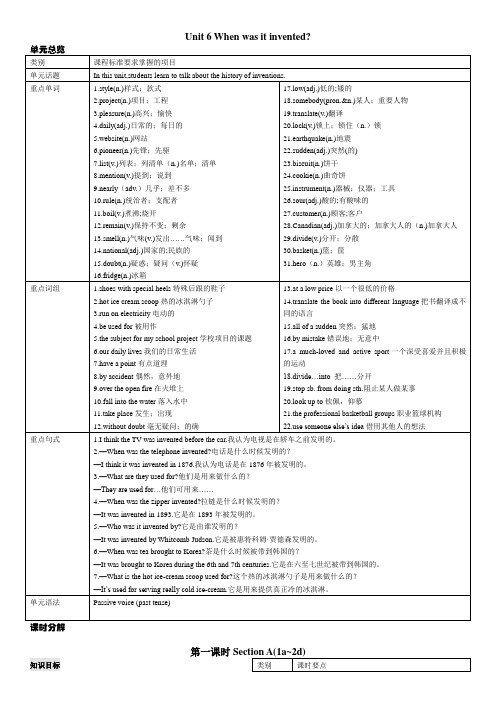
Unit 6 When was it invented?课时分解第一课时知识目标§自主学习方案【新词自查】根据句意及汉语提示完成句子。
1.I like the color of this coat but I don’t like its style (款式).2.It’s my great pleasure (高兴) to have a talk with you.3.The little inventions have helped me a lot in my daily (日常的)life.4.Julia introduced a good website (网站)to me to learn English.5.My mother always lists(列清单)all things that she wants to buy before shopping.§课堂导学方案Step 1情景导入参考案例Teacher: There are many useful things in the world.They help us a lot in life.(Show some pictures on the screen) When were they invented?Students:_______________________________①The telephone was invented in 1876.②The computer was invented in……(4分钟)环节说明:通过课前的一个师生问答互动引入新课的话题;通过图片的展示和语言的描述创设了情境,激发了学生的学习兴趣和表达欲望。
Step 2完成教材1a-1c的任务【操作案例】1.要求学生翻开课本P41,迅速阅读1a部分的内容。
并按要求完成课本上相应的任务。
(1分钟)2.检查答案,要求全班一起给出答案并检查讨论。
2020-2021学年九年级英语上册导学案(人教版)
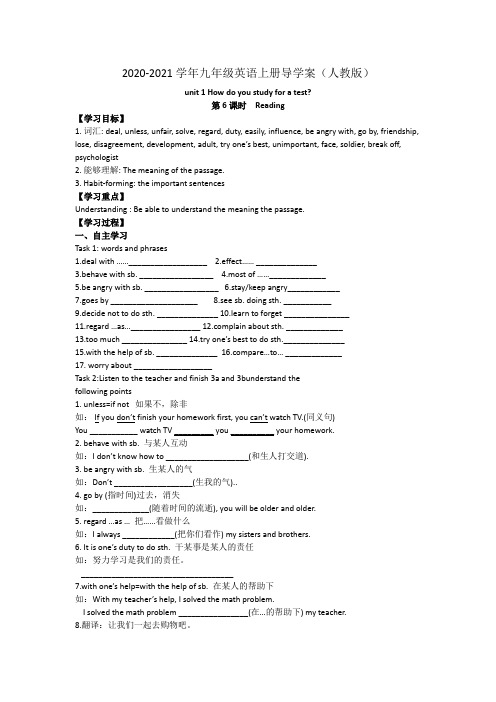
2020-2021学年九年级英语上册导学案(人教版)unit 1 How do you study for a test?第6课时Reading【学习目标】1.词汇:deal, unless, unfair, solve, regard, duty, easily, influence, be angry with, go by, friendship, lose, disagreement, development, adult, try one’s best, unimportant, face, soldier, break off, psychologist2.能够理解:The meaning of the passage.3.Habit-forming:the important sentences【学习重点】Understanding:Be able to understand the meaning the passage.【学习过程】一、自主学习Task1:words and phrases1.deal with ……__________________2.effect…… ______________3.behave with sb. _________________4.most of ……_____________5.be angry with sb. _________________6.stay/keep angry____________7.goes by ____________________8.see sb. doing sth. ___________9.decide not to do sth. ______________ 10.learn to forget _______________11.regard …as…________________plain about sth. _____________13.too much _______________14.try one’s best to do sth.______________15.with the help of sb. ______________pare…to… _____________17. worry about __________________Task2:Listen to the teacher and finish3a and3bunderstand thefollowing points1. unless=if not如果不,除非如:If you don’t finish your homework first, you can’t watch TV.(同义句)You ___________ watch TV_________you__________your homework.2.behave with sb. 与某人互动如:I don’t know how to ___________________(和生人打交道).3.be angry with sb. 生某人的气如:Don’t __________________(生我的气)..4.go by(指时间)过去,消失如:_____________(随着时间的流逝), you will be older and older.5.regard …as … 把……看做什么如:I always ____________(把你们看作) my sisters and brothers.6.It is one’s duty to do sth. 干某事是某人的责任如:努力学习是我们的责任。
Unit 6 导学案人教版九年级上册英语 Unit 6 导学案 Unit 6 导学案

Unit 6 I like music that I can dance to.Section A(1)【学习目标】1. To learn to understand and use relative clauses with that2. To listen and speak about music that you like【重点难点】重点:1. To learn to understand and use relative clauses with that难点:2. prefer v. 更喜爱,更喜欢remind sb. of sb. / sth. 提醒,使……记起…【预习案】1. Read and recite the wards from page 44 to 45 of the vocabulary.2. look at these sentences and try to understand them.I like music that I can dance to. 我喜欢可以边听边舞的音乐。
主语+谓语+宾语+定语从句(关系代词that指代先行词music引导定语从句,同时作定语从句谓语dance to的逻辑宾语。
)I like lessons that I can learn by myself. 我喜欢可以自学的功课。
I like jobs that I am interested in. 我喜欢我感兴趣的工作。
I like dogs that I can keep out. 我喜欢可以拒之门外的狗狗。
I like cats that I can stay away from. 我喜欢可以泰然处之的猫眯。
I like money that I can pick up. 我喜欢可以拣到的钱。
【探究案】1. prefer v. 更喜爱,更喜欢choose sth. rather than sth. else; like sth. better1) prefer + n. eg.I prefer groups that play quiet and gentle songs. 我更喜欢演唱轻柔音乐的组合。
2014新目标九年级英语Unit6 3a-3c 导学案
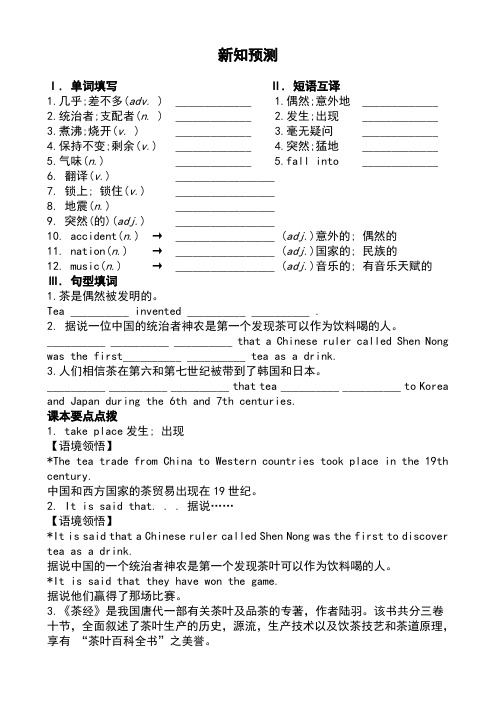
新知预测Ⅰ. 单词填写Ⅱ. 短语互译1.几乎;差不多(adv. ) _____________ 1.偶然;意外地 _____________2.统治者;支配者(n. ) _____________ 2.发生;出现 _____________3.煮沸;烧开(v. ) _____________ 3.毫无疑问 _____________4.保持不变;剩余(v.) _____________ 4.突然;猛地 _____________5.气味(n.) _____________ 5.fall into _____________6. 翻译(v.) _________________7. 锁上; 锁住(v.) _________________8. 地震(n.) _________________9. 突然(的)(adj.) _________________10. accident(n.) → _________________ (adj.)意外的; 偶然的11. nation(n.) → _________________ (adj.)国家的; 民族的12. music(n.) → _________________ (adj.)音乐的; 有音乐天赋的Ⅲ. 句型填词1.茶是偶然被发明的。
Tea __________ invented __________ __________ .2. 据说一位中国的统治者神农是第一个发现茶可以作为饮料喝的人。
__________ __________ __________ that a Chinese ruler called Shen Nong was the first__________ __________ tea as a drink.3.人们相信茶在第六和第七世纪被带到了韩国和日本。
__________ __________ __________ that tea __________ __________ to Korea and Japan during the 6th and 7th centuries.课本要点点拨1. take place发生; 出现【语境领悟】*The tea trade from China to Western countries took place in the 19th century.中国和西方国家的茶贸易出现在19世纪。
人教版九年级英语全册导学案

第1课时Unit 1 Section A 1a-2c【Le arning objectives】1 Knowing:flashcard,aloud,pronunciation,skill,voice2 Habit-forming: How do you study for a test? I study by、、、、、、、、、3 Communicating:Talk about how to study freely【Important leaning points】运用by doing 谈论学习方式【Learning process】一、自主学习(教师寄语:相信自己,一定能行!)Task1:Talk about how to study for the test1、完成下列短语与朋友一起学习制作抽认卡瞧课本制作词汇表听磁带向老师寻求帮助2、理解下列对话,并利用上面词组练习:A:How do you study for a test? B:I study by working with a group、A:How does Bob study for a test? B:I study by marking flashcards、3 、听录音,完成1 bTask2: Talk about how to learn English1、小组练习,利用下列句型谈论怎样学习英语、A:How do you learn English? B:I learn by 、、、、、、A:Do you learn by、、、、、、、、、? B:Yes,I do、 /No, I don't、2、理解2a、2b中的句子,找出下列短语:瞧英文光碟与朋友连交际大声读练习发音小组学习说的技能做、、、、、、、、、太难3、听录音,完成2a、2b4、根据听力内容,练习上面对话。
5、读听力材料,理解以下知识点:the best way to learn EnglishWho has an idea?keep a diary in Englishlook up new words in a dicctionary二、Cooperration (教师寄语:学会合作,提高自我)根据听力材料,小组自由讨论如何学好英语?三、Summary根据下面的句子,总结by的用法与含义:1、I have to be in bed by 10 o'clock、2、There is a tree by the river、3、I go to work by bus、4、The boy is sent to the hospital by a kind man、5、You can learn English by working with friends、四、诊断评价(一)补全单词:1、It's a good way to read a2、The boy often l up the words in the dictionary、3、Do you have an i about weekend?4、K a diary helps to write English every day、5、The girl often learn by a the teacher for help、6、What about reading about to practise p?(二)补全短文:A:Tom,I know you (数学学的很好)last term、How do you learn math?B:I learnt it (通过做很多题)A:What else?B: (通过向老师寻求帮助)A:Did you learn ?(通过小组学习) B: Yes, i did、( Lucy也就是)【课后反思】(教师寄语:从不断反思中完善自己,提高自己)第2课时Unit 1 SectionA 3a-4【Learning objectives】1、Knowing: specific, memorize, grammar, differently, frustrate, frusrating, quickly, add ,not at all, excited, end up、2、Understanding:Be able to understand the meaning of the passage in 3a、3、communicating: ---How do you learn English?---I often write vocabulary lists、【Important points】1、Understanding:Be able to understand the meaning of the passage in 3a、2、communicating: ---How do you learn English?---I often write vocabulary lists、【Learning process】一、自主学习Task1学习第4部分短语,谈论自己如何学习英语。
- 1、下载文档前请自行甄别文档内容的完整性,平台不提供额外的编辑、内容补充、找答案等附加服务。
- 2、"仅部分预览"的文档,不可在线预览部分如存在完整性等问题,可反馈申请退款(可完整预览的文档不适用该条件!)。
- 3、如文档侵犯您的权益,请联系客服反馈,我们会尽快为您处理(人工客服工作时间:9:00-18:30)。
九年级英语unit 6导学案重要短语:1. shoes with special heels 特殊后跟的鞋子2. hot ice-cream scoop热的冰其淋勺子5. the subject for my school project学校项目的课题6. our daily lives 我们的日常生活7. have a point有点道理8. by mistake 错误地9. by accident偶然,意外地13. make tea 泡茶14. take place 发生15. without doubt毫无疑问16. the saint of tea茶圣17. at a low price 以一个很低的价格18. take these photos 拍这些照片19. go out alone 单独外出20. all of sudden突然21. translate the book into different language 把书翻译成不同种的语言22. work on 从事,进行23. a much-loved and active sport一个深受喜爱并且积极的运动24. divide…into把…分开25. work together配合,合作26. at the same time同时27.stop sb from doing sth 阻止某人做某事28. dream of doing sth梦想做某事29. look up to钦佩,仰慕30. the professional basketball groups职业篮球机构31. decide on决定,判定32. come up with想到,想起33. lead to导致34. use someone else’s idea借用其他人的想法语法知识:一、一般过去时的被动语态的概念及构成一般过去时的被动语态表示过去某一时间的被动动作或过去经常性、习惯性的被动动作,由“主语+ was / were + 及物动词的过去分词+ by + 动作执行者”构成.This bridge was built in October last year. 这座桥是去年十月份建的。
These cakes were made by my mother last night. 这些蛋糕是我妈妈昨天晚上做的。
The girl said she was often beaten by her brother. 女孩说她经常被她兄弟打。
二、一般过去时的被动语态句型的变换方法一般过去时被动语态句型变换应围绕was, were进行,否定形式应在其后加not, 一般疑问句形式应将其提至句首,特殊疑问句形式应将一般疑问句置于特殊疑问词后面,反意疑问句形式应保留was / were。
如:His computer was not stolen by thieves last night. 他的电脑昨天晚上没有被小偷偷走。
Was your homework finished in time yesterday evening? 昨天晚上你及时完成家庭作业了吗?When was your letter written? The day before yesterday? 你的信是什么时候写的?前天吗?三、一般过去时的被动语态疑问句的回答方法一般过去时的被动语态的一般疑问句形式肯定回答用“Yes, ... was / were.”,否定回答用“No, ... wasn’t / weren’t.”; 特殊疑问句应抓住特殊疑问词进行回答,可用简略方法,也可用完整方法; 反意疑问句也应用“Yes, ... was / were.”或“No, ... wasn’t / weren’t.”进行回答。
如:—Was your office cleaned yesterday afternoon? 你的办公室昨天下午打扫了吗?—Yes, it was. / No, it wasn’t. 是的,打扫了。
/ 不,没有打扫。
—Were your rooms painted again last week? 你的房间上周重新粉刷了吗?—Yes, they were. / No, they weren’t. 是的,重新粉刷了。
/ 不,没有重新粉刷。
—When was your brother sent to work in Beijing? 你兄弟是什么时候被派到北京去工作的?—Last year. / He was sent to work in Beijing last year. 去年。
/ 他是去年被派到北京工作的。
词句讲解:invent (v.)发明;创造invent指发明创造出自然界本来不存在的东西,如工具、方法、手段、汽车、电器、合成材料等。
Bell invented the telephone. 贝尔发明了电话。
Smith invented a new teaching method. 史密斯发明了一种新的教学方法。
【横向辐射】discover, find, create1.discover是“发现”的意思,是指发现原来就有而一直没被发现,如发现电、煤、石油等矿藏及新星、星系或科学真理等。
Columbus discovered America in 1492.1492年哥伦布发现了新大陆。
Recently they have discovered a comet. 最近他们发现了一颗彗星。
2.find的意思是“寻找”,强调找的结果,并不指发现。
I've tried to find another copy but couldn't find one. 我试图再找一本,但没能弄到。
X k B 1 . c o m3.create指有目的地把原材料制成新产品,也指创造出原来不存在的或与众不同的事物。
Man creates himself. 人类创造了自己。
A novelist creates characters and a plot. 小说家塑造人物并设计情节。
【课堂变式】根据语境提示,用invent, discover,find或create的形式填空,完成句子。
1.When _____ the stream engine(蒸汽机)___?2.I can’t ____ my bike, I’m looking for it.3. Scientists are now trying to ___ if this is possible.4. Do you know who______ the plane?5. He ____quite a number of wonderful characters in his play.【解析】I.1.was, invented 2.find 3.discover 4.invented 5. createdbe used for 用来做……此短语中的for是介词,表示用途,后接名词或动词-ing形式。
An orange is used for medicine. 桔子可以入药。
A pen is used for writing. 钢笔用来写字。
【横向辐射】be used as & be used by1.be used as 意为“被用作……”,介词as表示“作为”,其后一般接名词,强调使用的工具及手段。
【例句】English is used as the second language in many countries. 英语在许多国家被当作第二语言使用。
This room is used as their office. 这人房间被用作他们的办公室。
2.be used by 意为“被……使用”,介词by后面接动作的执行者(宾语)。
【例句】English is used by travelers and business people all over the world. 全世界的旅行者和商人们使用英语。
Tractors are used by the farmers. 农民使用拖拉机。
【课堂变式】1. 在中国英语作为外语来使用。
__________________________________2.教师用粉笔。
__________________________________3.毛衣是用来保暖的。
__________________________________【解析】1. English is used as a foreign language in China.2. Chalk is used by teachers.3.A sweater is used for keeping warm.pleasure n. 高兴,愉快;常用于口语中;it’s my pleasure. With pleasure.It’s my pleasure to help you look after your pet cat.我感到很荣幸帮你照看你的宠物猫。
【横向辐射】please, pleased, pleasure, pleasant 的区别一、please1.表请求或要求的语气。
是动词(及物动词)。
-Come in, please.请进来吧。
(或Pease come in)-Sit down, please.请坐。
(或Please sit down)2.表“讨好,讨人喜欢;喜欢”(不及物动词)或者“使···高兴,使···满意,使···喜欢”(及物动词)-Go where you please.你想去哪就去哪。
-What pleases you best?你最喜欢什么?二、pleased形容词。
表示“高兴的,喜欢的,满意的”。
它指的是人主观上感到的满足心理-I'm pleased to see you!见到你真高兴!常用句型有:be pleased to do sth.高兴做某事be pleased at/about/with/by 对···感到满意/高兴be pleased that从句对···感到满意/高兴三、pleasant形容词。
表示“令人愉快的”“让人感到满意”。
主语一般为物。
The walk was very pleasant. 那次散步很(让人)愉快。
四、pleasure名词表示“满足;乐趣;消遣、娱乐”It's a pleasure to read this book. 读这本书真是件乐事。
